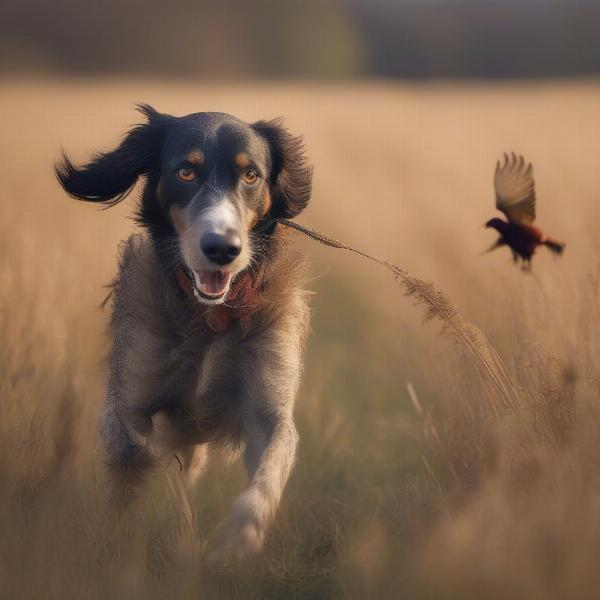The term “ugly hunting dog” is subjective, but it often conjures up images of dogs prized for their working abilities rather than their conforming to traditional breed standards of beauty. This article dives into the world of these unconventional hunting companions, exploring why appearance shouldn’t be the sole factor in choosing a hunting dog. We’ll discuss what truly makes a hunting dog effective, looking beyond aesthetics and focusing on the traits that matter most in the field.
Many hunters prioritize function over form, recognizing that a dog’s effectiveness in the field is determined by its skills, drive, and temperament, not its physical appearance. So, what should you look for in a hunting dog? Traits like a keen sense of smell, high prey drive, trainability, stamina, and a cooperative nature are far more critical than a perfect coat or a symmetrical face. A dog with exceptional hunting instincts, even if it’s considered “unattractive” by some, can be a prized partner in the hunt.
Unconventional Looks, Exceptional Abilities: What to Look For
While beauty standards vary, some breeds or mixed breeds often fall under the “ugly” label due to their unusual features. However, these dogs can be incredibly effective hunters. Instead of focusing on aesthetics, prioritize the following traits:
- Strong Hunting Instincts: Look for breeds known for their natural abilities, whether it’s retrieving, pointing, flushing, or tracking.
- Trainability: A dog that learns quickly and responds well to commands is essential for a successful and safe hunting experience.
- Stamina and Endurance: Hunting often requires covering long distances and navigating challenging terrain. A dog with physical and mental stamina is crucial.
- Temperament: A cooperative and biddable temperament makes for a pleasant and productive hunting companion.
 Hunting dog retrieving a bird in a field
Hunting dog retrieving a bird in a field
Choosing the Right “Ugly” Hunting Dog for You
Several breeds known for their hunting prowess might not win any beauty contests but are highly valued by hunters. These include breeds like the Catahoula Leopard Dog, Plott Hound, and Wirehaired Pointing Griffon. Mixed breeds can also possess exceptional hunting abilities, often inheriting the best traits from their parent breeds.
When choosing a hunting dog, consider the type of game you’ll be hunting and the terrain you’ll be navigating. Different breeds excel in different hunting styles. For example, a retriever is ideal for waterfowl hunting, while a scent hound is better suited for tracking game.
Caring for Your Unconventional Hunting Companion
Regardless of its appearance, every hunting dog needs proper care to stay healthy and perform at its best. This includes a balanced diet, regular veterinary checkups, and consistent training.
- Nutrition: A high-quality diet formulated for active dogs is essential to fuel their energy demands.
- Veterinary Care: Regular checkups and vaccinations are crucial for preventing illness and maintaining optimal health.
- Training and Socialization: Consistent training and socialization are essential for developing a well-behaved and reliable hunting partner.
“A dog’s worth is measured in its heart and its ability, not its appearance,” says Dr. Emily Carter, a veterinarian specializing in working dog health. “Many so-called ‘ugly’ dogs possess the drive and instincts that make them exceptional hunters.”
Conclusion
The concept of an “ugly hunting dog” is truly in the eye of the beholder. While some may prioritize aesthetics, experienced hunters understand that a dog’s true value lies in its performance in the field. By focusing on traits like hunting instincts, trainability, and temperament, you can find a loyal and effective hunting companion, regardless of its appearance. Remember, a dog’s heart and ability are far more important than its conformity to conventional beauty standards.
FAQ
- What breeds are considered “ugly” hunting dogs? The term is subjective, but breeds like the Catahoula Leopard Dog, Plott Hound, and Wirehaired Pointing Griffon are sometimes considered unconventional in appearance.
- Are “ugly” hunting dogs less effective than conventionally attractive breeds? Absolutely not. Their effectiveness depends on their hunting instincts, training, and temperament, not their looks.
- What should I prioritize when choosing a hunting dog? Focus on traits like hunting instincts, trainability, stamina, and temperament.
- How do I care for a hunting dog? Provide a balanced diet, regular veterinary care, consistent training, and plenty of exercise.
- Where can I find reputable breeders of less common hunting breeds? Research breed-specific rescue organizations or contact hunting clubs for referrals.
- Are mixed breed dogs good hunting dogs? Yes, mixed breeds can inherit excellent hunting traits from their parent breeds.
- How important is training for a hunting dog? Training is crucial for developing a safe, reliable, and effective hunting partner.
About ILM Dog: ILM Dog provides expert advice on dog breeds, health, training, nutrition, grooming, and much more. We offer valuable resources for both novice and experienced dog owners. From choosing the right breed to understanding your dog’s specific needs, ILM Dog is your trusted source for all things canine. Contact us at [email protected] or +44 20-3965-8624 for expert guidance on dog care and training.